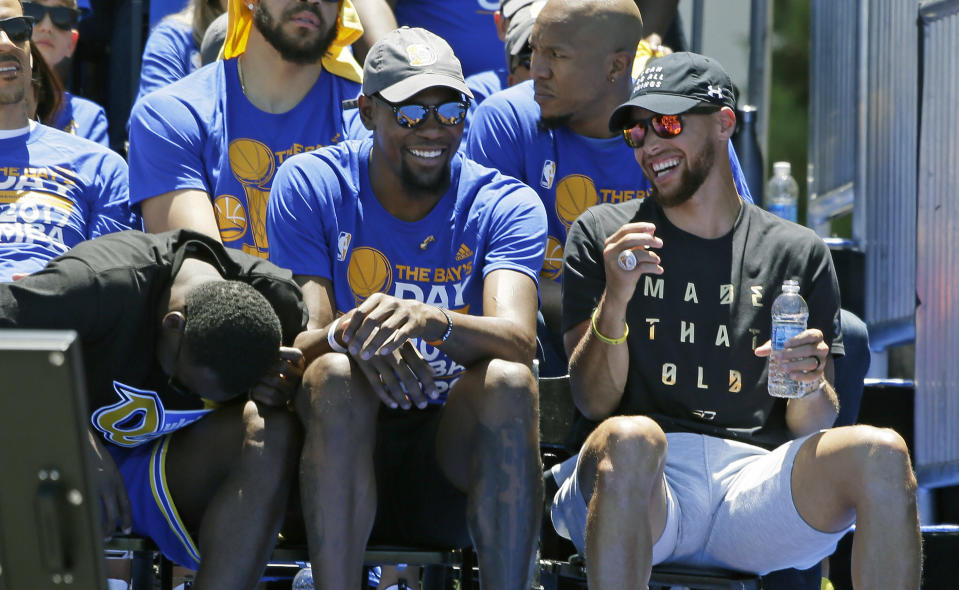Kevin Durant: 'All of [the best players] on a few teams' is 'what this league is about'

Much of the criticism levied at Kevin Durant for joining the Golden State Warriors last summer was rooted in the idea that a 73-win team added arguably the second-best player in the entire NBA. Sure, some folks weren’t fans of the “If you can’t beat ’em, join ’em” mentality of jumping from the Oklahoma City Thunder to the team that beat them in a seven-game Western Conference Finals, but mostly people were upset with the idea that the NBA’s 2017 champions were a foregone conclusion.
Durant defended his decision, contending that free agency provides everyone the opportunity to decide what’s best for them, and for him it was playing with selfless players in the Bay Area, which was admirable, considering how much flak he had to know was coming his way when he left OKC.
[Now’s the time to sign up for Fantasy Football! Join for free]
Durant even put his money where his mouth was when he accepted a $10 million pay cut in order to facilitate Golden State’s re-signings of Stephen Curry, Andre Iguodala and Shaun Livingston. Yet, during a wide-ranging conversation with The Athletic’s Anthony Slater in which he made an inarguable point — “It’s my money. It’s my decision, I can do what the hell I want with it.” — Durant still managed to throw detractors a couple bones when discussing the consolidation of talent out West this summer:
Q: Were you surprised by some of the blowback?
Durant: “They only (criticized) it because it’s the Warriors and it’s me and they love to hate anything we do right now. A lot of players have (taken pay-cuts). It wasn’t that I wanted the praise. I’ve learned from Tim Duncan and Dirk Nowitzki and how it has helped them over the years, and I thought, if they did it, why can’t I? Why shouldn’t I sacrifice? People wanted the money to break us up, and I didn’t want that to happen.”
(Aside: I’m not aware of any blowback about Durant’s pay cut, at least not outside the lunatic fringe on Twitter, maybe. But if there was blowback of any note, criticizing a player for taking less money to ensure his teammates make more and the team as a whole remains better is insanity of high order.)
And:
Q: So you guys are intact with 12 returning players including your entire core, plus a couple of other nice pieces. But the landscape around you out west has shifted a ton. I assume you’ve been following. What have you thought of all these moves?
DURANT: “Yeah. You’re just seeing a lot of these GMs buckling down and saying, you know what, let’s swing for the fences. Let’s see what we can do. Anything can happen. You gotta respect it. Before, you’ve seen GMs be conservative, try to save money or build through the draft every year. Just try to be OK. But teams aren’t just settling for that. They’re trying to win and trying to win now and they want to put the best players together.
“It’s a great league and you want to see the best players on the biggest stage. Why not see the best players? All of them on a few teams. Why not see that? That’s what this league is about. It’s star-driven and it’s good to see that the stars dictate how the league is supposed to go. Then the next group of stars will do the same and the same after that. I think that’s what we’re starting.”
This? This is the stuff that will really irritate fans in cities not named Oakland or San Francisco.
Personally, I’m not certain NBA general managers ever thought, Hey, let’s “just try to be OK.” Sure, some owners might be conservative about spending, especially if they know they have no shot of winning a title, and some GMs figure the best way to build a team is through the draft, especially in small markets and on historically poor teams that have no chance of acquiring superstar talent.
But you can be sure, if a team had the opportunity to acquire a player of Durant’s caliber in the past, they would be lining up to sign him. Nobody should understand this better than Durant, who turned teams away in order to pare down his list of six free agency meetings in 2016. And, yes, not every team has been as successful at building its roster as Golden State, but that isn’t always for a lack of trying.
Oh, and the Warriors, when they won the 2015 title before Durant signed, were built through the draft.
Durant has responded to questions about super-teams by acknowledging LeBron James “paved the way” for them by joining Dwyane Wade and Chris Bosh on the Heat in 2010, but there are few cities that could have made that possible. Utah, Indiana, Oklahoma City, Milwaukee, you name the small-market city, and they would kill to be the landing spot for a free agent of Durant’s caliber.
The reality is those teams have a hard time keeping homegrown stars, let alone adding other stars. Granted, OKC did trade away James Harden over a contract dispute, so maybe Durant saw the Thunder add Paul George and thought to himself, Hey, they never did stuff like that when I was there, and that led to his rather depressing view of how conservatively NBA general managers prefer to operate.
Which brings us to Durant’s analysis of the Timberwolves adding Jimmy Butler and Jeff Teague:
“So you got, what, four All-Star caliber players over there on one team. And why not? Why shouldn’t you have that? That’s what fans want to see. They don’t want to see all role players and a couple good guys. Nah, you want to see all the best players. That’s what Minnesota did. Thibs (coach Tom Thibodeau), you know, he’s got some cojones. I knew he was going to pull something off.”
I mean, yeah, fans definitely want to see rosters full of quality players, and in an ideal world every team would be loaded with superstar talent, but unfortunately there are 30 teams and maybe 30 All-Star-worthy players in the league at a given time, so beyond eliminating three-quarters of the league and consolidating teams in major markets, some franchises will have to suit up a role player or 13.
[Follow Ball Don’t Lie on social media: Twitter | Instagram | Facebook | Tumblr]
The Wolves only got to this position by trading Kevin Love, an All-Star who no longer wanted to play in Minnesota, to a Cleveland Cavaliers super-team for the No. 1 overall pick, being so bad that they got the No. 1 pick the following year, and then trading two more lottery picks for Butler, before Teague decided to join the team. Which is to say they also built through the draft and these things take time.
It is true that Durant’s move to the Warriors forced other teams to “up our risk profile and get even more aggressive,” as Houston Rockets GM Daryl Morey told ESPN.com before trading for Chris Paul. I understand the NBA is a star-driven league, and I’m all for employees dictating their professional choices, but seeing all the best players on a few teams is definitely not what the league is about.
In fact, the salary cap is designed to prevent that very thing from happening, and the only reason Durant was able to join the Warriors was because he was a free agent in a year when the cap jumped by 32 percent. As I’ve written before, more power to him for taking advantage of that loophole, but if you’re wondering if the NBA was designed to let that happen, just ask NBA commissioner Adam Silver:
“I’ve read several stories suggesting that that’s something that the league wants, this notion of two super-teams, that it’s a huge television attraction,” Silver said form the 2016 NBA Board of Governors meeting. “I don’t think it’s good for the league, just to be really clear. I will say whoever is the prohibitive favorite, try telling that to the 430 other players who aren’t on those two teams. I mean, we have the greatest collection of basketball players in the world in our league, and so I’m not making any predictions, but there’s no question, when you aggregate a group of great players, they have a better chance of winning than many other teams.
“On the other hand, there are lots of things that have to happen. We’ll see what happens in Golden State,” he continued. “You had a great, great chemistry among a group of players and you’re adding another superstar to the mix, so it’ll be interesting to see what happens. But just to be absolutely clear, I do not think that’s ideal from a league standpoint.”
Silver softened that stance at his annual state-of-the-league address this past spring, when the Warriors and Cavaliers coasted through the two conferences and met each other in the Finals for the third straight season, emphasizing “celebrating excellence” and the league’s need to “do a better job developing more great players in this league” (to essentially create Durant’s utopian NBA):
“My answer is, let’s create more great teams, rather than completely focus on one incredible team and whether that’s seemingly unfair to the other team. I think it’s the nature of competition. Ultimately, it’s about raising the bar for all the teams in this league and celebrating excellence.”
Still, I’m guessing Silver doesn’t endorse Durant’s take on the blowout-heavy 2017 playoffs: “If you don’t like it, don’t watch it.” Because the NBA generates much of its revenue from people watching it, and if fans ever tuned out because a few teams feature all the best players, the business model fails. I’m not saying that will happen, and I’m not even saying Durant joining the Warriors is bad for the NBA, because like Silver I tend to think “these things have a way of working themselves out.”
At risk of being another media member who Durant believes is “always trying to nitpick us,” when he says stuff like, “People wanted the money to break us up,” and, “They don’t want to see all role players and a couple of good guys,” I think what he really means is, It’s OK that I’m on the Warriors, and I genuinely hope everyone else becomes as awesome at basketball like us. But it just came out wrong.
– – – – – – –
Ben Rohrbach is a contributor for Ball Don’t Lie and Shutdown Corner on Yahoo Sports. Have a tip? Email him at rohrbach_ben@yahoo.com or follow him on Twitter! Follow @brohrbach



